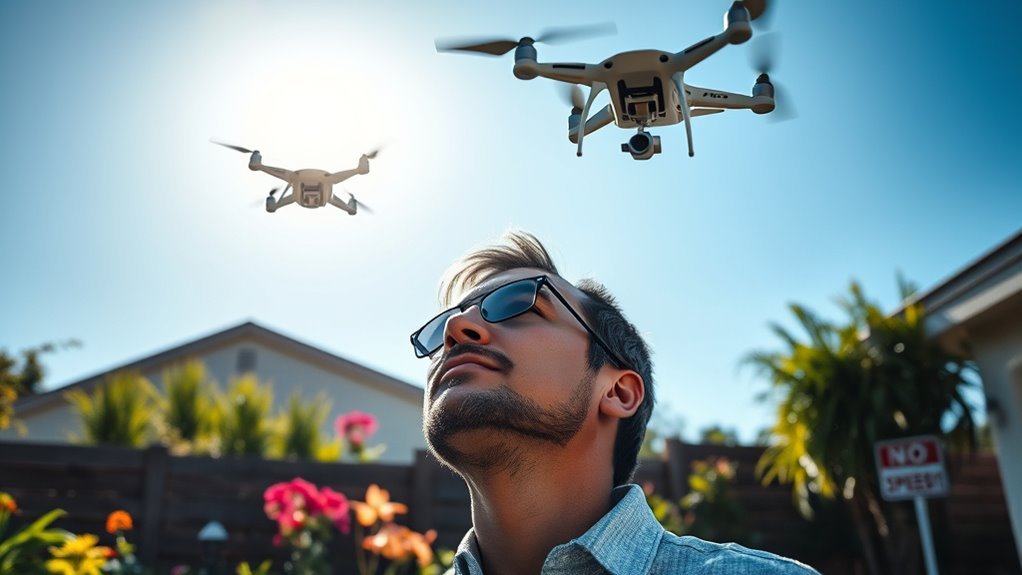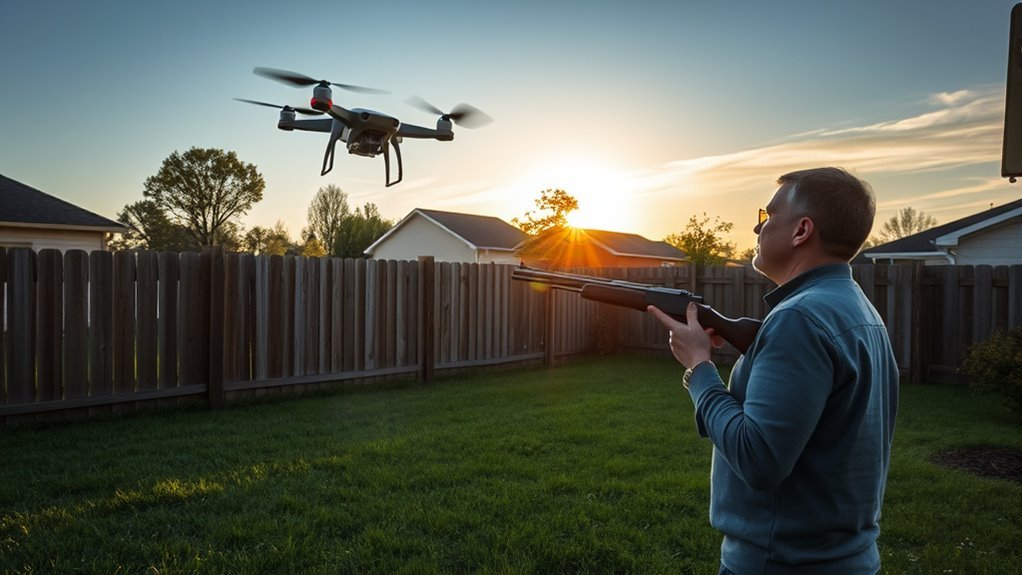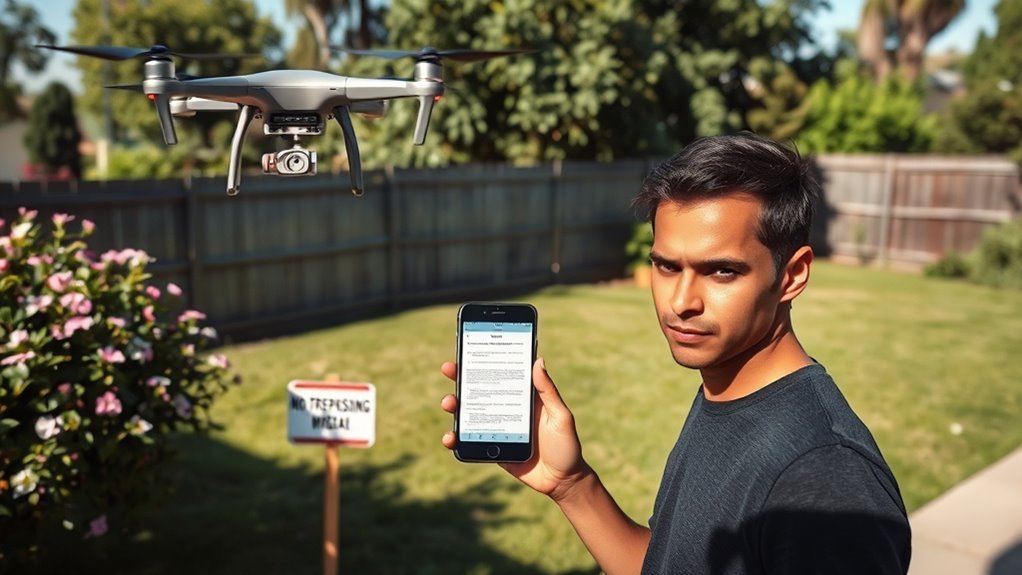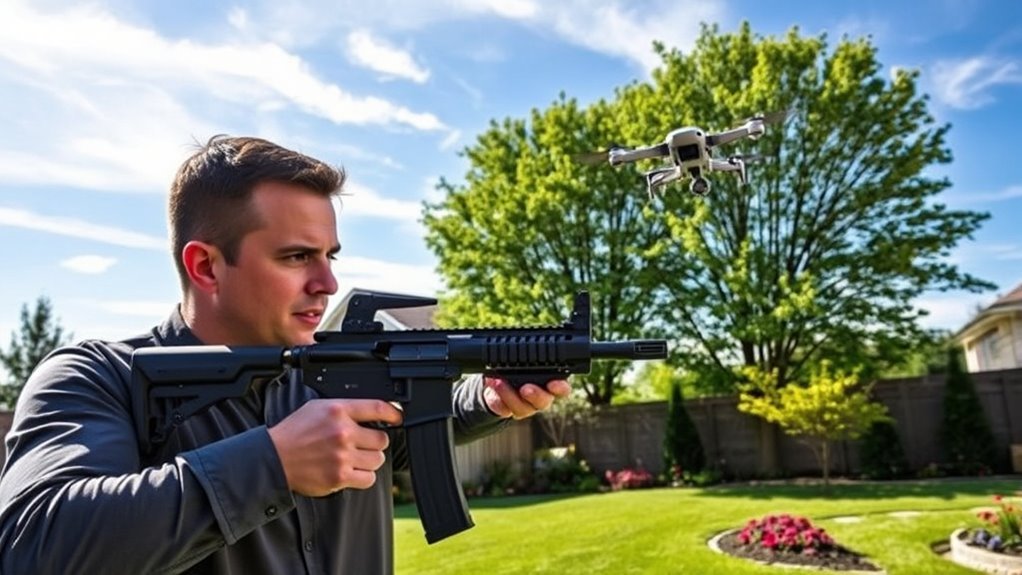You can’t legally shoot down a drone over your property without first understanding federal and local laws. Property ownership doesn’t grant unrestricted control over the airspace above. Federal regulations protect navigable airspace, making interference or destruction of a drone potentially a criminal offense. Some states may have specific rules, but force must be reasonable and justified. Violating these can lead to serious legal consequences. To protect your rights properly, you need to assess applicable regulations and alternative responses carefully.
Understanding Drone Regulations in Your Area

Before considering any action against a drone, you must thoroughly understand the regulations governing drone use in your jurisdiction. Drone privacy laws vary considerably, and local ordinances may impose specific restrictions on drone operations near private property. You should review federal guidelines alongside municipal rules to determine what constitutes lawful drone activity. Ignorance of drone privacy protections can lead to unintended legal consequences if you act prematurely. Your right to freedom includes protecting your privacy, but it must be balanced with compliance to established laws. Consult authoritative sources or legal counsel to clarify permissible responses. Only with a clear grasp of these regulations can you confidently assess whether any defensive measures against a drone are legally justifiable within your area.
Property Rights and Airspace Boundaries

You need to understand that property ownership does not extend indefinitely into the air above your land. The legal limits on airspace vary, often giving regulatory agencies control beyond a certain altitude. Recognizing these boundaries is essential before considering any action against a drone flying overhead.
Understanding Airspace Ownership
Although property ownership grants you control over the land itself, it does not automatically extend to the airspace above it beyond certain limits defined by law. Understanding airspace ownership is vital when considering your rights over drones flying near your property. Your property boundaries clearly mark your land’s horizontal limits, but airspace ownership is more nuanced. The federal government regulates navigable airspace, which generally starts above a specific altitude, limiting your control in that zone. However, you may have rights to the immediate airspace above your property, often referred to as the “useful airspace,” where you can reasonably expect to exclude intrusions. Recognizing these distinctions is essential to protect your freedom while respecting established legal frameworks. This clarity helps you determine when intervention, such as shooting down a drone, might be legally justified.
Legal Limits on Property
While property rights grant you control over your land, the legal boundaries of that control—especially regarding airspace—are limited and well-defined by law. You don’t own the sky above your property indefinitely; federal regulations assert control over navigable airspace, restricting your authority. Property boundaries mark your terrestrial domain, but airspace rights extend only to the immediate reaches necessary for your use and enjoyment, not the altitude at which drones typically operate. Drone trespassing becomes a complex issue, as drones often fly in regulated airspace above your property without violating your legal rights. Understanding these limits is vital before considering any action against drones. Exercising freedom responsibly means recognizing that shooting down a drone may violate federal laws, despite perceived intrusions within your property boundaries.
Federal Laws Governing Drone Use

Because drone technology has advanced rapidly, the federal government has established specific laws regulating their use to guarantee safety and privacy. You must understand that federal drone regulations protect the national airspace laws, which designate the sky as a public domain. These laws prohibit you from damaging or interfering with aircraft, including drones, because they operate under federal jurisdiction. Shooting down a drone can violate the Federal Aviation Administration’s rules and the Aircraft Sabotage Act, exposing you to severe civil and criminal penalties. While you have rights to privacy and property, federal law prioritizes airspace safety and commerce. To protect your freedoms responsibly, you should seek legal remedies rather than taking violent action against drones. Knowing these federal constraints is essential before considering any intervention.
State and Local Laws on Drone Interference
Federal laws set clear boundaries on how drones can be treated in the national airspace, but state and local regulations add another layer of rules that you must also consider. State laws vary greatly; some explicitly prohibit damaging or interfering with drones, while others provide limited property rights against low-flying drones. Local regulations may impose additional restrictions or protections, reflecting community standards and priorities. Before taking any action, you must thoroughly research the specific state laws and local regulations applicable in your area. Understanding these legal nuances guarantees you respect your rights without violating statutes that protect drone operations. Exercising caution and knowledge of both state laws and local regulations empowers you to safeguard your property within the confines of lawful conduct.
Potential Legal Consequences of Shooting Down a Drone
If you decide to shoot down a drone, you must be aware that doing so can expose you to serious legal consequences. Engaging in such action may result in significant legal repercussions including criminal charges, civil liabilities, and potential federal penalties. Understanding drone liability is essential before taking any measures.
| Legal Aspect | Description | Possible Outcome |
|---|---|---|
| Criminal Charges | Violating federal/state laws | Fines, imprisonment |
| Civil Liability | Damage claims by drone owners | Monetary compensation |
| Federal Penalties | Interference with aircraft | Hefty fines, federal charges |
| Property Rights | Limited by airspace regulations | Lawsuits, injunctions |
You must weigh these risks carefully to protect your freedom without violating the law.
Alternative Actions to Take Against Intrusive Drones
If you encounter an intrusive drone, you should report the incident to the appropriate authorities promptly. Additionally, employing approved drone deterrents can help mitigate potential risks without violating laws. Understanding these alternatives guarantees you respond effectively while staying within legal boundaries.
Reporting to Authorities
Although taking direct action against a drone might seem tempting, reporting the incident to the appropriate authorities is often the safest and most effective course. You should familiarize yourself with official reporting procedures to guarantee your drone complaints are documented correctly and promptly. Contact local law enforcement or relevant aviation authorities to provide detailed information, including time, location, and any identifying features of the drone. This approach preserves your legal rights and helps authorities address potential violations without risking your safety or legal repercussions. By adhering to established reporting protocols, you contribute to a framework that respects your property rights while maintaining public safety and lawful drone use. Remember, responsible reporting is a powerful tool in protecting your freedom and deterring unlawful drone activity.
Using Drone Deterrents
When an intrusive drone invades your privacy or property, employing drone deterrents offers a practical and lawful alternative to direct confrontation. You can consider technologies such as drone jamming, which disrupts the drone’s communication signals, forcing it to land or return to its operator without physical harm. Another effective method is net capture, where specialized devices safely ensnare the drone mid-flight, preventing damage to your property and the drone itself. These deterrents respect legal boundaries, allowing you to protect your freedom without resorting to potentially unlawful actions like shooting down drones. Always verify that the deterrent methods you choose comply with local laws and regulations, safeguarding your rights while maintaining public safety and responsible drone use.
When Self-Defense Justifies Use of Force on a Drone
Since drones can pose immediate threats to your safety or property, understanding when self-defense justifies the use of force is essential. In self defense scenarios involving drone threats, the force you use must be reasonable and necessary to prevent imminent harm. If a drone is intruding aggressively, surveilling in a way that compromises your security, or is actively engaged in illegal activity that endangers you or your property, you may have grounds to act. However, the use of force should be proportionate, targeting only the specific threat posed by the drone without escalating beyond what’s required. Always assess the situation carefully, as the legal protections for drone operators are evolving, and unjustified actions can lead to significant legal consequences.
Reporting Unauthorized Drone Activity to Authorities
Taking action against a threatening drone isn’t always the safest or most legally sound choice. When you suspect unauthorized surveillance or a violation of drone privacy on your property, the appropriate response is to report the activity to local law enforcement or the Federal Aviation Administration (FAA). Provide detailed information, such as the drone’s appearance, flight patterns, and any identifying markings. This guarantees authorities can assess the situation within the bounds of the law. Reporting unauthorized drone activity supports your right to privacy while avoiding potential legal repercussions from taking matters into your own hands. Always document incidents thoroughly and avoid direct confrontation. By relying on official channels, you preserve your freedoms responsibly and uphold the rule of law in addressing drone-related concerns.
Consulting Legal Professionals for Drone Disputes
Although you might feel compelled to handle drone disputes independently, consulting legal professionals secures your actions align with current laws and regulations. The consultation benefits include expert guidance that helps you avoid costly legal pitfalls and guarantees your right to freedom is respected without overstepping boundaries. When considering legal advice, focus on:
Consult legal experts to ensure your drone dispute actions comply with laws and protect your rights safely.
- Understanding property rights versus federal airspace regulations.
- Identifying lawful responses to unauthorized drone presence.
- Evaluating potential consequences of shooting down a drone.
- Steering through state and local ordinances that may affect your options.

